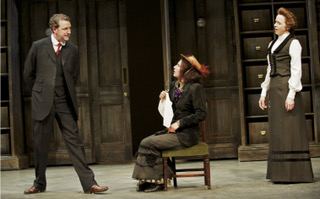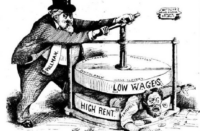The immediate social background to George Bernard Shaw’s most famous comedy, Pygmalion (1912), is the growing British women’s suffrage movement at the time. The play is as much about class relations as it is about women’s rights. For Shaw, the two are inseparable.
Pygmalion is about practical, intelligent women from different social classes. In addition to Liza Doolittle, two other women are significant: Mrs Pearce, Henry Higgins’s Scottish housekeeper, and his mother, Mrs Higgins.
Quite unimpressed by her employer, Mrs Pearce speaks in very practical terms about economic and social aspects concerning the young woman’s position in the household, as well as her income, and realistically foresees difficulties after the wager is won or lost. Undaunted, Mrs Pearce also watches over Liza’s dignity. She corrects Higgins’s behaviour and his crude expression (the man who plans to teach Liza “refined” manners and speech), demanding some control over these in Liza’s presence.
In this respect, Mrs Pearce, who comes from the same class as Liza, assumes the role of her defender almost from the beginning.
Interestingly, Mrs Higgins expresses a similar insight. So, within the bourgeoisie too there is a practical woman who sees the situation and the dangers clearly. Like Mrs Pearce, she recognises that switching Liza to the bourgeoisie’s way of life would result in her no longer being able to support herself.
Liza herself confidently insists from the beginning on her human equality. She insists on her right not to be watched by any police, and wants to pay for Higgins’s language lessons. Despite Higgins’s sarcasm and his indifference towards her further career, Liza asserts her dignity and ultimately emerges as the strongest person in the play. There is no bourgeois male figure of comparable stature. The gentlemen are not aware of this, of course.
Shaw does not make it easy for his mainly middle-class audience to grasp his intention either. We are presented with highly educated men, erudite linguists, as well as a representative of the working class, Liza’s father, Alfred Doolittle, who is in no way inferior to the academics in intellect.
Higgins is misanthropic and views women as mindless beings who expect from life chocolate, clothes and taxis as well as a “good” marriage. A woman’s self-realisation through her own work does not occur to him. In this regard it is all the more understandable that his greatest crisis arises when Liza tells him that from now on she will make her living by teaching. That this will involve phonetics is his greatest threat, for Liza has a more musical ear than he and can go far.
Despite better manners, Higgins’s colleague Pickering, like Higgins, thinks the wager is won when Liza performs the great miracle and is able to pass herself off as a duchess. Together with Higgins, he enjoys the moment of this triumph without admitting that it is actually Liza’s achievement. Nor does he ever ask what is to become of Liza now.
Alfred Doolittle comes across to a bourgeois audience as uneducated and unsophisticated, almost comical, yet he has enormous self-confidence and belongs unmistakably to the working class. Like Liza, he demonstrates class-consciousness and the potential of this class: “I’m one of the undeserving poor . . . I don’t need less than a deserving man: I need more. I don’t eat less hearty than him; and I drink a lot more. I want a bit of amusement, ’cause I’m a thinking man. I want cheerfulness and a song and a band when I feel low . . . I’m undeserving; and I mean to go on being undeserving.”
Shaw’s insistence on the human superiority of the working class is also reflected on a linguistic level. For months, Higgins drills Liza in bourgeois “small talk.” She learns completely meaningless phrases by heart; but her need for meaningful conversation overwhelms her, and she falls back into her own speech at the tea party, and everything threatens to get out of hand.
The evening after Liza’s “success,” Higgins treats her like his servant. When she asks, “What’s to become of me?” Higgins suggests she could marry, and she responds with great insight: “We were above that at the corner of Tottenham Court Road . . . I didn’t sell myself. Now you’ve made a lady of me I’m not fit to sell anything else. I wish you’d left me where you found me.
When Higgins asks her about her suitor, Freddy, “Can he make anything of you?” Liza counters this insult with an answer that Higgins couldn’t even conceive of: “Perhaps I could make something of him. But I never thought of us making anything of one another; and you never think of anything else.” Liza has a far greater degree of humanity and insight than any middle-class character in the play. Added to this is her sense of equality.
For Shaw, the false happy ending of conventional comedy—a marriage between Higgins and Liza—is out of the question. It is precisely because of his understanding of class and the class conflict that such an ending is impossible. Shaw holds up a mirror to the primarily bourgeois English audience to raise doubt over, if not to shake, their complacent sense of superiority. The play ends with Liza’s departure and Higgins’s unreformability.
Shaw identifies with the class to which his heroines belong, and he does so as a socialist, yet as an outsider. At the same time his fellow-Irishman, the painter and decorator Robert Tressell (Robert Noonan), also born in Dublin, wrote the first working-class novel in English-language literature.






